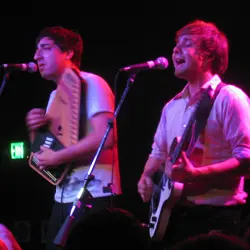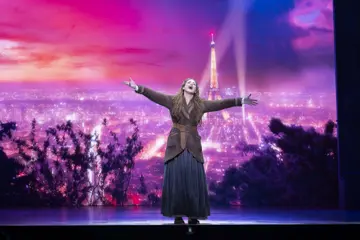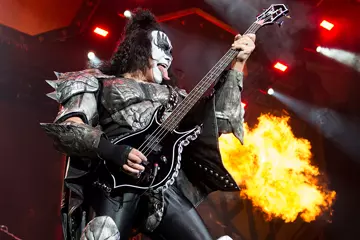 Grizzly Bear
Grizzly BearWhen last we heard from Christopher Taylor, the 31-year-old bassist/multi-instrumentalist/in-house producer for beloved Brooklyn outfit Grizzly Bear, he'd gone solo; issuing an album as Cant and then touring Australia, last summer, with a band that included Devonte 'Lightspeed Champion/Blood Orange' Hynes. “I started to feel this need to pursue something that was just something that I was interested in, that I didn't have to discuss with other people,” Taylor said, on the release of Cant's Dreams Come True. “I just didn't want to deal with compromising.”
Yet, after some summer fun with his dark and synthy side-project, Taylor returned to the Grizzly Bear fold, and set out helming recordings for the band's fourth album, Shields, the follow-up to 2009's feverishly-acclaimed Veckatimest. So, what was it like returning to the world of compromise after a stint as a boss calling the shots?
“Um… interesting,” Taylor defers, with a laugh. “I knew what I was getting back into. That was part of the deal with Cant: it was this thing I could do right now, then it would be back to the Grizzly Bear lifestyle. In general, coming back was really cool. We've all grown up a lot since we last recorded. And there's a lot more confidence in each other. There were more unplanned decisions on previous [Grizzly Bear] records; just that spontaneous 'yeah, that's great, sure'. But this one was definitely about trying to challenge ourselves to do something different. We did not want to make the second version of Veckatimest. That seemed really boring to us.”
Did Grizzly Bear feel, however, that this was exactly what the rest of the world wanted: 'the second version of Veckatimest'? “That's a really interesting question, actually. Really interesting. Because you don't really know,” Taylor ponders, as if weighing it up. “The mood for Veckatimest and the mood for Shields is so different, almost opposite. And I wonder how that's going to go over with people. And I don't know. That's where your question's interesting; because maybe people really did want the second version of Veckatimest, and they might not like this record at all.”
Don't miss a beat with our FREE daily newsletter
Shields isn't just different to its predecessor, but to the entire Grizzly Bear back catalogue. From 2004's Horn Of Plenty (when Grizzly Bear were essentially the solo project for principle songwriter Ed Droste) to 2006's Yellow House (the first album Grizzly Bear recorded as a band) to Veckatimest, what defined the albums was a sense of space and a love of harmony, with a predominantly acoustic sound and a fondness for cascading four-part vocals. For many, there was a folkie edge etched into their sound. Shields, however, is a sprawling, proggy opus; a succession of shape-shifting composition open to discordance.
“There's definitely a heaviness to this record,” Taylor says, of Shields. “Our minds are all a lot heavier with stuff; we're all 30 now instead of 26. And it's a different place in your head. There's a lot of peering over the edge of proper adulthood at 30… There's just so much more self-reflection at this stage than when you're younger. Which I think is actually nice, because I remember feeling like older songs of ours lacked that amount of reflective quality, which is something I really like in music. I thought that was a cool thing to get into; to get into seriousness, and heaviness.”
This narrative effectively writes itself: after feeling the freedom of the solo project, Taylor is lured back into the struggle of collaboration. And, Grizzly Bear, faced with the onerous burden of following-up a breakout success – the album that led them from the Brooklyn underground to the ears of Jay-Z and Beyoncé, Twilight-loving tweens, and corporate America at large – suffer through the difficult second album syndrome (even if, y'know, it was their fourth). Yet, Taylor claims he was unprepared for all of it; that, in his mind – feeling fresh, clean, and optimistic after moving from Brooklyn to the woodlands of Germantown in upstate New York – the Shields recordings were going to proceed with ease. “I was really ready to have something feel really easy,” Taylor says. “That was what I was hoping it was going to be. But it was anything but; this record ended up being harder than any others.”
Why on earth did Taylor think following up Veckatimest was going to be easy? “I don't know!” he laughs. “I feel like I've grown and learned a lot since we did Veckatimest. I've worked with a lot of other artists, I've been working on my solo thing, we've all grown up so much more, and we've already spent all this time playing together. There were times when I was doing things in Cant, and I was looking forward to how easy it was going to be when I was back working in this old collaborative relationship with guys that I knew worked truly well together. I thought, 'This is gonna be great; we'll have all this experience under our belt, and we'll be able to nail things we haven't been able to nail in the past, and it'll all come together, and just be, like, cool'. I really thought that was how it was going to go, the first month we got together. And it certainly did not go that way.”
It's not too much of a strain to hear that struggle in Shields' songs, which carry a more ornery air than anything the band have done previously. If Veckatimest was easy to love, sometimes Shields can feel difficult to like; the songs having a tortured feeling, as if they're trying to pull themselves apart; this discordance kept hanging together by Taylor's meticulous production. Pulling double-duty – as both player and producer; though maybe it's triple-duty, too, with engineering concerns – Taylor was working extra hard on the LP, and feeling the frustrations of the sessions doubly.
“But it was a productive frustrating,” Taylor says, “because I think we actually really tried to get to know who each other were. And that's a hard process. Like, we know a lot about one another, but this time it went deeper. I think we all respect one another more than we used to. It's a longer relationship, now. We really wanted to know how to do what would really satisfy everyone; we really cared about making everyone feel pleased with it. So, that was the challenge, [and] that's a challenge where you care a lot. It's a nice challenge. And it means that even if it's hard, you persist, and you do so with a kind of care, because its origins are in the right place. It's coming from the heart. And it's a lot harder to do that; a lot of bands get to this place and they just do like their cocaine record. Because it's easier to do that than to really explore your relationship as a band, and to really get to the heart of what it means to be in your band, and what exactly you want that to mean.”
Grizzly Bear will be playing the following shows:
Saturday 10 November - Werribee Park, Melbourne VIC
Sunday 11 November - Werribee Park, Melbourne VIC
Monday 12 November - Billboard, Melbourne VIC
Friday 16 November - Metro Theatre, Sydney NSW
Saturday 17 November - Parramatta Park, Sydney NSW
Sunday 18 November - City Botanic Gardens, Brisbane QLD















